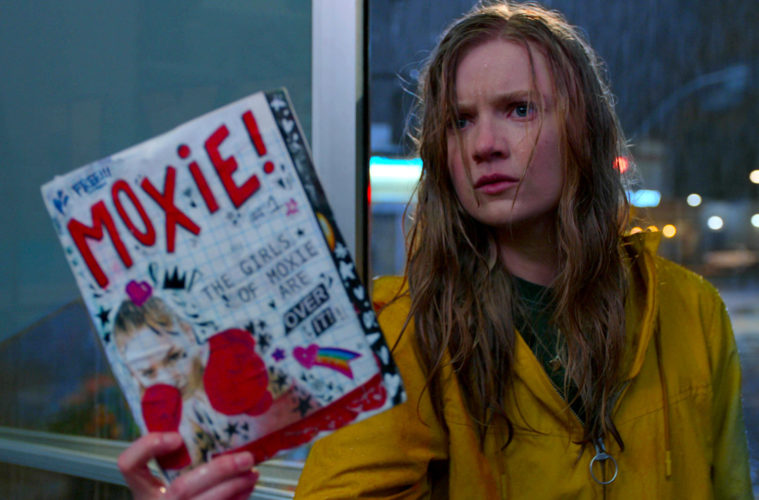 Built on Amy Poehler’s name recognition and all the good intentions in the world, Netflix’s Moxie is an optimistic, coming-of-age romp about female empowerment that does its best to instill a positive message in its storytelling. But is it successful? The answer: kinda sorta, but not really.
Built on Amy Poehler’s name recognition and all the good intentions in the world, Netflix’s Moxie is an optimistic, coming-of-age romp about female empowerment that does its best to instill a positive message in its storytelling. But is it successful? The answer: kinda sorta, but not really.
Directed by Poehler and based on a novel by Jennifer Mathieu, Moxie stars Hadley Robinson as Vivian, the shy, woke teenage daughter of a former Riot Grrrl (Poehler) who wants to make a difference. Viv opts to come out of her shell in an effort to protect the female student body from the masochistic attitudes that run rampant in her high school hallways. Tired of shithead jocks and the preferential treatment they receive from the principal (Marcia Gay Harden), Vivian takes a tip from her mom’s wild, rebellious past and starts a feminist zine to spotlight the problems in her school. Apparently, in this world, social media isn’t a big factor in the lives of average high school students. These teens rarely glance at a phone (unless exposition is needed), nor cast an eye towards a single YouTube video.
The crux of Moxie is about power: who has it, who uses it, and who needs it. In this case, power is abused by the athletes of the school who are protected by the senior staff, while fringe groups are nullified by the system. It is one of many tropes that run rampant in the hallways of this particular high school as the story falls victim to every cliche in the John Hughes handbook of mainstream teen movies. And unlike her cohort Tina Fey’s Mean Girls, there’s no self-aware satire to make this tolerable. All this can be forgiven with good acting and writing, and for the most part, the cast really tries to sell the messaging even with pigeonholed characters, but it doesn’t quite cut it.
Moxie is a fun little frolic that touches on Gen-Z concerns and offers a taste of ’90s nostalgia via Doc Martens’ embellished wardrobes and a Bikini Kill soundtrack. If it stayed on point in that mindset, it probably would have been a harmless teen genre film with a few serious notes.
However, the biggest cinema sin falls in the final act, when characters use past traumas as a war cry against the hierarchy. It is forgivable to create an unrealistic world in which unrealistic characters dwell, but to use a very serious, very real issue such as sexual assault to rally characters is slightly irresponsible. It’s a terrible cliche, especially when used only to add importance to a character or a situation. In the case of Moxie, it’s meant to create a “happy ending” against the story’s antagonist, but it just feels like a cheap ploy.
Poehler surely wanted to inspire young women to take control of their lives by living the adage: “well behaved women rarely make history,” and she succeeds to a degree. Giving a voice to those who need to scream is a great basis for a film about young people, but this one leans on stereotypes to do it, so we’re left with muddled messaging and ultimately, some pretty un-rebellious movie making.
Advertising disclosure: We may receive compensation for some of the links in our stories. Thank you for supporting LA Weekly and our advertisers.

